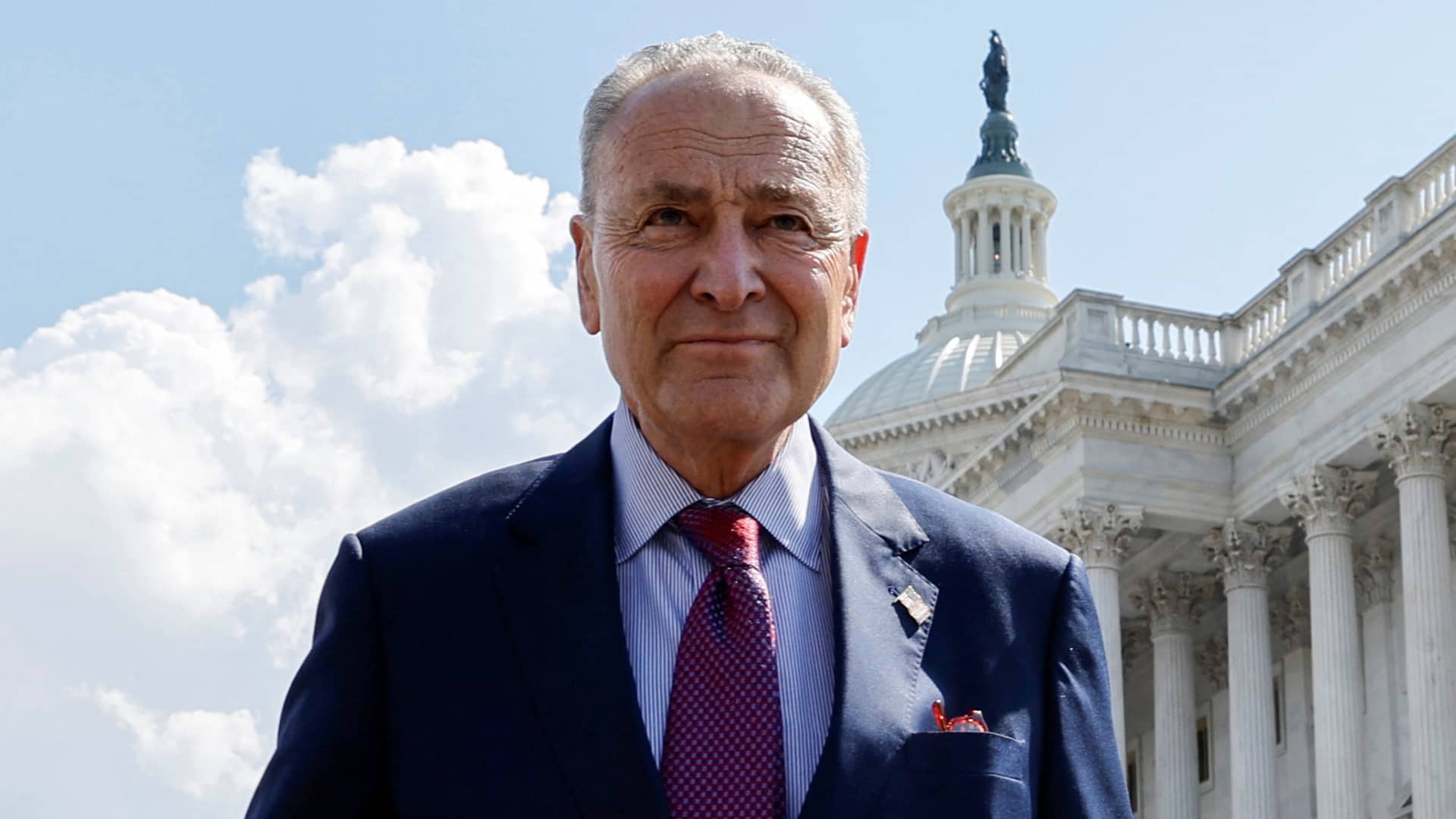
- Automakers are winners in the Inflation Reduction Act, but maybe not as much as you think, and maybe not Tesla.
- Utilities (and ratepayers) get tax breaks for renewable energy.
- Amazon on the list of companies likely to pay more taxes.
- Elon Musk's prediction that lithium refiners will get rich will receive help from this bill.

Want to know what the Inflation Reduction Act means for the market's biggest companies, as well as for your wallet? When it comes to politics, you always have to follow the money – and remember that the devil is in the details.
The Senate on Sunday passed the bill that's designed to fight climate change, make significant tax changes, trim the federal deficit, cut drug prices for Medicare recipients and extend expanded health insurance subsidies under the Affordable Care Act. As it moves to the House of Representatives, the roster of the winners and losers under the bill is coming into sharper focus even before it goes to President Joe Biden.
For both winners and losers, the impact is more modest than you would think, given the sheer size of the numbers being bandied about. That's because of details like strings attached to some of the new or extended tax breaks, or the schedule for implementing Medicare's negotiations with big pharmaceutical companies over drug prices.
Changes will be more gradual than many headlines imply.
Beginning with the biggest-dollar provisions of the 10-year package of spending and tax cuts, these are some of the effects American corporations and citizens will see from the law. The two biggest changes are the bill's deficit reducers – just two provisions of the law that account for 80% of its $300 billion in deficit reduction, according to Moody's Analytics.
Losers: Big tax-avoiding corporations

The biggest provision by far of the package is the $313 billion Moody's Analytics says will be raised over 10 years by imposing a 15% minimum tax on corporate profits for businesses that earn at least $1 billion a year.
Get a weekly recap of the latest San Francisco Bay Area housing news. >Sign up for NBC Bay Area’s Housing Deconstructed newsletter.
Money Report
The law also cracks down on the practice of letting companies announce one set of profit figures to investors, while using another set of numbers that include tax loopholes to show the government. This happens by applying the 15% rate to the "book rate" profits companies disclose to Wall Street, says the liberal-leaning Roosevelt Institute.
The institute says 55 big companies paid no net federal taxes in 2020, including names like Nike, Salesforce.com, Archer Daniels Midland and FedEx. They would have owed $8.5 billion in 2020 at the standard corporate tax rate of 21%, the organization said.
A report by the Center for American Progress says 19 companies in the Fortune 100 alone paid little or no tax in 2021. Among companies that paid 6% or less, as calculated by the liberal-leaning think tank: Amazon, Exxon Mobil, AT&T, Bank of America, and both Ford and General Motors. All of them will likely be paying more.
Losers: Drug companies (but not as much as you think)

The government will save $288 billion by negotiating over drug prices, Moody's says, and that's a win for senior citizens – but some experts say the change will be more gradual and phased in than many consumers expect.
That's because the law will only let Medicare negotiate over a few drugs in the early years of its implementation. Medicare will only be able to haggle over 10 drugs in fiscal 2026, and new medications will not be subject to negotiation for nine to 13 years after their market introduction, said Tricia Neuman, executive director of the Program on Medicare Policy at the Kaiser Family Foundation.
"Savings are exponentially smaller than under the [2019] House bill, which covered many more drugs," Neuman said. That bill would have let Medicare negotiate terms with 25 top drugs initially, and expanded faster.
One win for seniors is a $2,000 annual cap on their contribution to prescription spending. Most recipients now spend less, but cancer patients can easily spend $10,000 or more, according to a 2019 study. That gives Medicare recipients certainty about drug expenses, Neuman said.
The impact on companies isn't completely clear because it's not known yet exactly which drugs will be the first subjected to price negotiations, Neuman said. In 2020, Medicare spent more than $1 billion on each of nearly 40 drugs. Bristol Myers Squibb's blood-clotting treatment Eliquis ($9.9 billion), Bristol Myers Squibb's cancer treatment Revlimid ($5.4 billion), and Johnson and Johnson's blood-clotting drug Xarelto ($4.7 billion) top the list.
What about the spending part of the bill?
Among so-called spending in the bill is actually targeted tax cuts, which the congressional Joint Committee on Taxation calls tax expenditures. One of the three biggest ones in this package, which together account for three-fourths of the $313 billion in tax breaks, is an extension of existing health-care law.
It would extend the subsidies for health insurance under Obamacare that were increased during the Covid pandemic, keeping the benefit hikes from expiring Dec. 31.
People who buy insurance through Obamacare are among the winners. An estimated $64 billion of the package will be in the form of tax credits for people who purchase health insurance on internet exchange markets like Healthcare.gov, according to Moody's. These credits subsidize the cost of coverage for people whose employers don't offer benefits and who make too much to be eligible for Medicaid, and were expanded in Covid relief legislation to make policies more affordable.
The provision extends the credit for three years, adding nothing to the deficit after fiscal 2026, Moody's says. Without it, an estimated 3.1 million Americans would have lost health-care coverage, estimates the Center on Budget and Policy Priorities.
Winners: Car companies (but maybe not Tesla)
The other big headlines on the "spending" side of the bill are the extension of the $7,500 consumer income tax credit for the purchase of new electric vehicles, and the addition of a new, $4,000 credit for buying a used EV. But the details of the bill make assessing short-term winners and losers complicated.
First, the bill caps the price of eligible new cars at $55,000, excluding the most popular version of Tesla's Model 3 (as well as all Model S and X vehicles). Trucks and vans can get the credit if they cost less than $80,000. Even that's a modest win for Tesla, which has not offered its buyers any tax credits since it used up the 200,000 credits it was allotted under existing law. Most or all vehicles from startups like Lucid Motors and Rivian are also excluded under the new bill, at least until they introduce planned cheaper models.
"The Model 3 is right on the border," said Chris Lafakis, energy economist at Moody's Analytics.
More crucially, the bill includes requirements for domestic manufacturing of EVs and their battery components to qualify for the extended credit. As written, the law requires that 40% of battery components be sourced from factories in the U.S. or its free trade agreement partners; that batteries be U.S. made by 2029; and that Chinese components and minerals be phased out beginning in 2024.
Right now, it is not clear if any U.S. battery plant can meet the law's requirements. To keep the credits flowing once the law takes effect next year, the Biden administration will have to waive some provisions of the soon-to-be-approved law.
One unexpected effect of the law will be to highlight a comment Tesla CEO Elon Musk made on the EV maker's most recent conference call, and has made before, that coming demand for EVs will make the next half-decade a great time to be an entrepreneur mining or refining the lithium that powers electric vehicle batteries. The law's buy-American provisions will only add to those pressures.
"It is basically like minting money right now. There's, like, software margins in lithium processing right now," Musk said on the recent earnings call. "So I would really like to encourage, once again, entrepreneurs to enter the lithium refining business. You can't lose."
Winners: Utilities and homeowners

About a third of the tax breaks in the bill — up to $113 billion — are to extend tax credits to encourage construction of renewable electricity plants, which have four times as much share of the U.S. market as they did a decade or so ago.
That's a boon to utilities, which either build plants themselves or buy power from independent operators, Lafakis said. Utilities will also benefit from selling additional power as electricity fuels more cars, trucks and appliances, thanks to tax breaks in the law.
More reliance on renewables should also benefit ratepayers, since new wind electricity plants are now much cheaper than new facilities that burn coal or natural gas, according to investment bank Lazard. In some cases, a new wind plant with existing tax subsidies can be cheaper than even continuing to run a coal plant that's already in use, Lazard said.
Ratepayers who own their own homes may also claim tax credits for shifting more of their home appliances to using electricity, which can be powered by renewables, rather than natural gas. Since most makers of electric hot water heaters and stoves also make gas models, it's not clear whether the law will cause any major shifts in market share.
"The clear winners are clean energy, solar and other renewables," said Robert Haworth, senior investment strategy director at U.S. Bank Wealth Management. "And it works hard to make sure there's not too much disincentive for fossil fuels.''
Winners: Hedge funds (for now)
Losers: Public company shareholders

The last minute deal with Arizona Sen. Kyrsten Sinema to gain her vote made Democrats drop a plan to impose ordinary income taxes on bonuses that hedge fund and venture capital managers make, closing a loophole that lets these financiers pay lower capital gains rates on money they never put at risk.
Instead, the plan imposes a 1% tax on stock buybacks – a corporate finance tactic companies use to boost earnings per share by reducing the number of shares outstanding with excess cash.
Proponents of the buyback tax, like Vermont Sen. Bernie Sanders, contend that companies can put their cash to work investing more in plants and higher salaries. Opponents say it will hurt returns of retirement plans and pension funds.
Companies in the Standard & Poor's 500 stock index spent $850 billion on buybacks last year.






